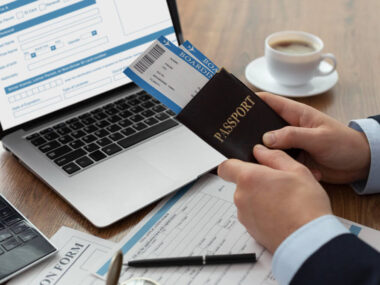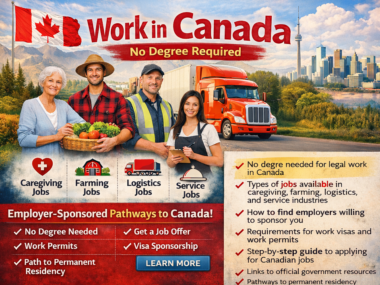Are you dreaming of working in Germany, one of the most prosperous and innovative countries in Europe? Do you want to enjoy a high quality of life, a rich culture, and a diverse society? If so, you will need to obtain a German work permit, a legal document that allows you to work in Germany for a specific period of time and under certain conditions.
Getting a German work permit can be a complex and lengthy process, especially if you are not familiar with the German bureaucracy and regulations. In this comprehensive guide, we’ll walk you through the various types of German work visas and provide you with a clear step-by-step roadmap to obtain one.
We will cover the following topics:
- Do you need a visa to work in Germany?
- What are the types of German work visas and which one is right for you?
- What are the requirements and documents for applying for a German work visa?
- How to apply for a German work visa and where to submit your application?
- How to get a work permit in Germany after arriving in the country?
- How long does it take to process your German work visa and what are the fees?
By following this guide, you will be able to navigate the German immigration system and achieve your career goals in Germany.
Do you need a visa to work in Germany?
The first question you need to ask yourself is whether you need a visa to work in Germany or not. The answer depends on your nationality, qualifications, and type of employment.
If you are a citizen of the European Union (EU), the European Economic Area (EEA), or Switzerland, you do not need a visa to work in Germany. You can enter the country with your valid passport or national identity card and start working immediately. You only need to register your address at the local registration office (Einwohnermeldeamt) within two weeks of arrival.
If you are a citizen of Australia, Canada, Israel, Japan, New Zealand, South Korea, United Kingdom or the United States of America, you do not need a visa to enter Germany for tourism or business purposes. However, if you want to work in Germany, you will need to apply for a work permit after arriving in the country. You cannot start working until you have obtained your work permit from the local immigration office (Ausländerbehörde).
If you are a citizen of any other country, you will need a visa to enter Germany for any purpose, including working. You will need to apply for a work visa before traveling to Germany at the German embassy or consulate in your home country. You cannot enter Germany with a tourist or business visa and then apply for a work permit.
Types of German work visas
There are different types of German work visas that correspond to different categories of workers and employers. The type of work visa you need depends on your qualifications, skills, occupation, salary, and contract duration. Here are some of the most common types of German work visas:
- EU Blue Card: The EU Blue Card is a residence and work permit for highly qualified workers from non-EU countries who have an academic degree or equivalent qualification and a job offer in Germany with an annual salary of at least 56,800 euros (or 44,304 euros for shortage occupations such as engineers, IT specialists, doctors, or nurses) in 2023.
The EU Blue Card allows you to work and live in Germany for up to four years and gives you access to social benefits and mobility within the EU.
- Skilled Immigration Act: The Skilled Immigration Act is a new law that came into effect on March 1st, 2020. It aims to facilitate the immigration of skilled workers from non-EU countries who have an academic degree or vocational training qualification and a job offer in Germany that matches their qualifications.
The Skilled Immigration Act also allows skilled workers who do not have a job offer yet to come to Germany for up to six months to look for one, provided they have sufficient funds and language skills.
- Job Seeker Visa: The Job Seeker Visa is a temporary residence permit that allows qualified professionals from non-EU countries who have an academic degree or equivalent qualification and at least five years of relevant work experience to come to Germany for up to six months to look for a job that matches their qualifications.
The Job Seeker Visa does not allow you to work in Germany during this period. You will need to apply for a work permit once you have found a suitable job.
- Freelance Visa: The Freelance Visa is a residence and work permit that allows self-employed professionals from non-EU countries who offer services such as consulting, teaching, translating, or artistic activities to work in Germany without an employer. The Freelance Visa requires you to have a clear business plan, a portfolio of clients or contracts, sufficient funds, and health insurance.
The Freelance Visa is valid for up to three years and can be extended if your business is successful.
- Working Holiday Visa: The Working Holiday Visa is a residence and work permit that allows young people from certain countries who are between 18 and 30 years old to come to Germany for up to one year to travel, learn the language, and work part-time. The Working Holiday Visa is available for citizens of Australia, Canada, Israel, Japan, New Zealand, South Korea, and some other countries. The Working Holiday Visa requires you to have a valid passport, a return ticket, health insurance, and sufficient funds.
- Internship Visa: The Internship Visa is a residence and work permit that allows students or graduates from non-EU countries who want to gain practical experience in Germany to do an internship for up to one year.
The Internship Visa requires you to have an academic degree or be enrolled in a university program, have a confirmed internship offer from a German company or organization, have health insurance, and have sufficient funds.
- Au Pair Visa: The Au Pair Visa is a residence and work permit that allows young people from non-EU countries who are between 18 and 26 years old to come to Germany for up to one year to live with a host family and help with childcare and household chores.
The Au Pair Visa requires you to have a basic knowledge of German, have a signed contract with a host family, have health insurance, and have sufficient funds.
These are some of the most common types of German work visas, but there may be other options depending on your specific situation. You can consult with the German embassy or consulate in your home country to find out which type of work visa is best for you.
German work visa requirements
Once you have determined which type of work visa you need, you will need to prepare the necessary requirements and documents for your application.
The exact requirements and documents may vary depending on the type of work visa, your nationality, and your qualifications. However, some of the general requirements and documents that apply to most types of work visas are:
- A valid passport: Your passport must be valid for at least six months beyond your planned stay in Germany and have at least two blank pages.
- A completed application form: You will need to fill out an application form for the type of work visa you are applying for. You can download the application form from the website or get it from the German embassy or consulate in your home country.
- A passport-sized photo: You will need to provide a recent passport-sized photo that meets the biometric specifications (35 x 45mm) for German visas.
- A job offer or contract: You will need to provide a written job offer or contract from your employer in Germany that states your position, salary, working hours, and duration of employment. The job offer or contract must be in German or accompanied by a certified translation.
- A recognition notice: If your occupation is regulated in Germany (such as doctors, nurses, teachers, lawyer etc.), you will need to provide a recognition notice that confirms that your foreign are equivalent to the German ones. You can apply for a recognition notice from the qualifications relevant authority in Germany.
- Proof of qualifications: You will need to provide copies of your academic degrees or vocational training certificates that prove your qualifications for the job. You may also need to provide transcripts of records, diplomas, or other relevant documents. All documents must be in German or accompanied by a certified translation.
- Proof of language skills: Depending on the type of work visa and the job requirements, you may need to provide proof of your language skills in German or English. You can prove your language skills by taking a recognized language test such as TestDaF, IELTS, orTOEFL or by providing certificates from language courses or schools.
- Proof of financial means: You will need to prove that you have enough money to cover your living expenses in Germany for the duration of your stay. You can prove your financial means by providing bank statements, scholarship letters, sponsorship letters, or other documents that show your income or savings.
- Proof of health insurance: You will need to prove that you have adequate health insurance coverage for your stay in Germany. You can either buy a travel health insurance policy from an approved provider such as MAWISTA, Care Concept, HanseMerkur, or join the statutory health insurance system in Germany such as AOK, or Barmer.
- Proof of accommodation: You will need to prove that you have a place to stay in Germany for the duration of your stay. You can prove your accommodation by providing a rental contract, a hotel reservation, or a letter of invitation from a friend or relative in Germany.
These are some of the general requirements and documents that you will need to apply for a German work visa, but there may be additional or specific requirements and documents depending on your situation. You can consult with the German embassy or consulate in your home country to find out the exact requirements and documents for your type of work visa.
German work visa application
Once you have prepared the necessary requirements and documents for your type of work visa, you will need to submit your application to the German embassy or consulate in your home country.
You will need to follow these steps to apply for a German work visa:
- Make an appointment: You will need to make an appointment online or by phone with the German embassy or consulate in your home country to submit your application.
- Submit your application: On the day of your appointment, you will need to go to the German embassy or consulate in person and submit your application. You will need to bring your original passport, your completed application form, your passport-sized photo, and all the required documents.
You will also need to pay the visa fee, which is usually 75 euros for most types of work visas. You may also need to provide biometric data (such as fingerprints and facial image) and undergo an interview with a visa officer.
- Wait for the decision: After submitting your application, you will need to wait for the decision from the German authorities. The processing time may vary depending on the type of work visa, your nationality, and the workload of the embassy or consulate. It can take from a few days to several months. You can check the status of your application online or by contacting the embassy or consulate.
- Collect your visa: If your application is approved, you will receive a notification from the embassy or consulate. You should check the details of your visa (such as validity, duration, and number of entries) and report any errors or discrepancies immediately.
Getting a work permit in Germany
Once you have received your visa, you can travel to Germany and start working. However, depending on the type of work visa you have, you may also need to apply for a work permit after arriving in Germany.
A work permit is a separate document that grants you permission to work in Germany under certain conditions. Here are some of the steps you need to take to get a work permit in Germany:
- Register your address: Within two weeks of arriving in Germany, you will need to register your address at the local registration office (Einwohnermeldeamt) in your city or town.
You will need to bring your passport, your visa, your rental contract or letter of invitation, and a registration form (Anmeldeformular). You will receive a registration certificate (Anmeldebestätigung) that confirms your address and personal details.
- Apply for a tax identification number: After registering your address, you will automatically receive a tax identification number (Steueridentifikationsnummer) by mail within a few weeks.
This is a unique 11-digit number that identifies you as a taxpayer in Germany. You will need this number to pay taxes, open a bank account, and receive social benefits in Germany.
- Apply for a residence permit: Depending on the type of work visa you have, you may also need to apply for a residence permit (Aufenthaltstitel) at the local immigration office (Ausländerbehörde) in your city.
A residence permit is an electronic card that contains your personal and biometric data, such as your name, date of birth, nationality, photo, and fingerprints. A residence permit also specifies the purpose and duration of your stay, as well as the conditions and restrictions of your work permit.
You will need to apply for a residence permit within three months of entering Germany or before your visa expires, whichever is earlier. You will need to bring your passport, your visa, your registration certificate, your tax identification number, your job offer or contract, your proof of qualifications, your proof of health insurance, and a completed application form.
You will also need to pay a fee, which is usually between 50 and 150 euros for most types of residence permits.
- Apply for a work permit: Depending on the type of work visa you have, you may also need to apply for a work permit (Arbeitserlaubnis) at the local employment agency (Agentur für Arbeit) in your city.
You will need to apply for a work permit before starting your job or within one week of receiving your residence permit, whichever is later. You will need to bring your passport, your residence permit, your job offer or contract, your proof of qualifications, and a completed application form.
You will also need to pay a fee, which is usually 20 euros for most types of work permits.
These are some of the steps you need to take to get a work permit in Germany, but there may be additional or specific steps depending on your situation.
German work visa processing time
The processing time for your German work visa may vary depending on the type of work visa, your nationality, and the workload of the authorities. It can take from a few days to several months. Here are some of the factors that can affect the processing time of your German work visa:
- The completeness and accuracy of your application: If your application is incomplete or contains errors or inconsistencies, it may delay the processing time or result in rejection.
You should make sure that you fill out the application form correctly and provide all the required documents in the proper format and language.
- The availability and verification of your documents: If some of your documents are missing or hard to obtain or verify, it may delay the processing time or result in rejection. You should make sure that you have all the original documents and certified copies or translations ready before applying.
You should also check if some of your documents need to be legalized or apostilled by the authorities in your home country or in Germany.
- The demand and quota for your type of work visa: If there is a high demand or a limited quota for your type of work visa, it may delay the processing time or result in rejection.
You should check if there are any restrictions or preferences for certain categories of workers or employers in Germany. You should also apply as early as possible to increase your chances of getting a visa.
- Cooperation and communication with the authorities: If there is a lack of cooperation or communication between you and the authorities, it may delay the processing time or result in rejection.
You should follow the instructions and guidelines from the authorities carefully and respond to any requests or queries promptly. You should also keep track of the status of your application and contact the authorities if you have any questions or concerns.
You can check the status of your application online or by contacting the embassy or consulate.
Conclusion
We hope that this guide has helped you understand how to get your German work permit in 2024. Working in Germany can be a rewarding and enriching experience that can boost your career and personal growth. However, getting a German work permit can be a challenging and time-consuming process that requires careful planning and preparation. We wish you all the best with your German work permit application and hope that you will have a successful and enjoyable stay in Germany
Also read:






